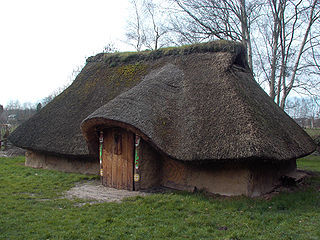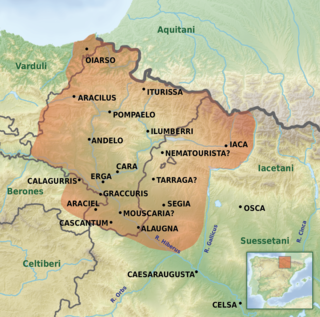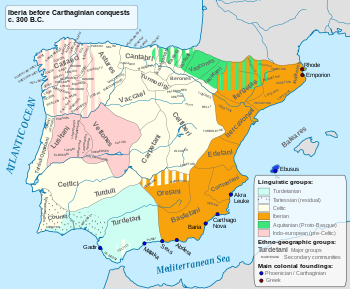
Gallia Aquitania, also known as Aquitaine or Aquitaine Gaul, was a province of the Roman Empire. It lies in present-day southwest France, where it gives its name to the modern region of Aquitaine. It was bordered by the provinces of Gallia Lugdunensis, Gallia Narbonensis, and Hispania Tarraconensis.

The Menapii were a Belgic tribe dwelling near the North Sea, around present-day Cassel, during the Iron Age and the Roman period.

The Remi were a Belgic tribe dwelling in the Aisne, Vesle and Suippe river valleys during the Iron Age and the Roman period. Their territory roughly corresponded the modern Marne and Ardennes and parts of the Aisne and Meuse departments.

The Vascones were a pre-Roman tribe who, on the arrival of the Romans in the 1st century, inhabited a territory that spanned between the upper course of the Ebro river and the southern basin of the western Pyrenees, a region that coincides with present-day Navarre, western Aragon and northeastern La Rioja, in the Iberian Peninsula. The Vascones are often considered ancestors of the present-day Basques to whom they left their name.
The Volcae were a Gallic tribal confederation constituted before the raid of combined Gauls that invaded Macedonia c. 270 BC and fought the assembled Greeks at the Battle of Thermopylae in 279 BC. Tribes known by the name Volcae were found simultaneously in southern Gaul, Moravia, the Ebro valley of the Iberian Peninsula, and Galatia in Anatolia. The Volcae appear to have been part of the late La Tène material culture, and a Celtic identity has been attributed to the Volcae, based on mentions in Greek and Latin sources as well as onomastic evidence. Driven by highly mobile groups operating outside the tribal system and comprising diverse elements, the Volcae were one of the new ethnic entities formed during the Celtic military expansion at the beginning of the 3rd century BC. Collecting in the famous excursion into the Balkans, ostensibly, from the Greek point of view, to raid Delphi, a branch of the Volcae split from the main group on the way into the Balkans and joined two other tribes, the Tolistobogii and the Trocmi, to settle in central Anatolia and establish a new identity as the Galatians.

The Suessiones were a Belgic tribe, dwelling in the modern Aisne and Oise regions during the La Tène and Roman periods.

The Aquitani were a tribe that lived in the region between the Pyrenees, the Atlantic ocean, and the Garonne, in present-day southwestern France in the 1st century BCE. The Romans dubbed this region Gallia Aquitania. Classical authors such as Julius Caesar and Strabo clearly distinguish the Aquitani from the other peoples of Gaul, and note their similarity to others in the Iberian Peninsula.

The Turduli or Turtuli were an ancient pre-Roman people of the southwestern Iberian Peninsula.

The Cantabri or Ancient Cantabrians, were a pre-Roman people and large tribal federation that lived in the northern coastal region of ancient Iberia in the second half of the first millennium BC. These peoples and their territories were incorporated into the Roman Province of Hispania Tarraconensis in 19 BC, following the Cantabrian Wars.

The Pictones were a Gallic tribe dwelling south of the Loire river, in the modern departments of Vendée, Deux-Sèvres and Vienne, during the Iron Age and Roman period.

The Lusones were an ancient Celtiberian (Pre-Roman) people of the Iberian Peninsula, who lived in the high Tajuña River valley, northeast of Guadalajara. They were eliminated by the Romans as a significant threat in the end of the 2nd century BC.

The Varduli were a pre-Roman tribe settled in the north of the Iberian Peninsula, in what today is the eastern region of the autonomous community of the Basque Country and western Navarre, in northern Spain. Their historical territory corresponds with current Basque-speaking areas; however, it is debated whether the Varduli were actually Aquitanians, related to the Vascones, or if they were Celts, related to tribes such as the Cantabri and Celtiberians and which later underwent Basquisation.

Novempopulania was one of the provinces created by Diocletian out of Gallia Aquitania, which was also called Aquitania Tertia.

The Parisii were a Gallic tribe that dwelt on the banks of the river Seine during the Iron Age and the Roman era. They lived on lands now occupied by the modern city of Paris, whose name is derived from the ethnonym.

The Ambiani were a Belgic coastal tribe dwelling in the modern Picardy region during the Iron Age and Roman periods.
The Ceutrones were a Gallic tribe dwelling in the Tarantaise Valley, in modern Savoie, during the Iron Age and Roman period.
The Salassi or Salasses were a Gallic or Ligurian tribe dwelling in the upper valley of the Dora Baltea river, near present-day Aosta, during the Iron Age and the Roman period.

The Bardili were a small, pre-Roman tribe of the Iberian Peninsula, and an offshoot of the widespread Turduli people, who lived in what is now southwestern Portugal in the 5th-1st centuries BC.
The Suessetani were a pre-Roman people of the northeast Iberian Peninsula that dwelt mainly in the plains area of the Alba (Arba) river basin, in today's Cinco Villas, Aragon, Zaragoza Province and Bardenas Reales area, west of the Gallicus river, east of the low course of the Aragon river and north of the Iberus (Ebro) river, in the valley plains of this same river. Their location, in relation to other tribes, was south of the Iacetani, west of the Vescetani or Oscenses north of the Lusones and Pellendones, also north of the Sedetani, and southeast of the Vascones.










